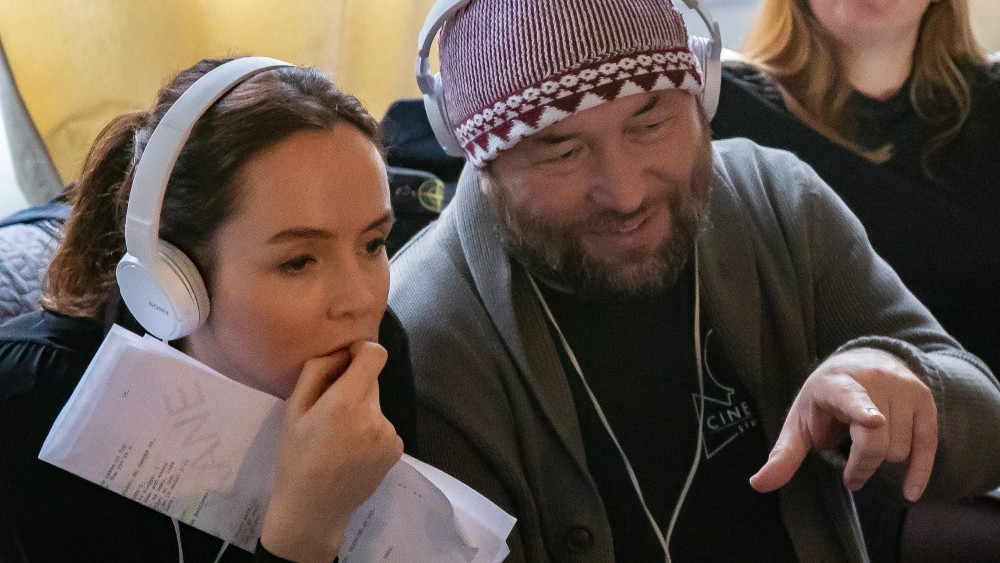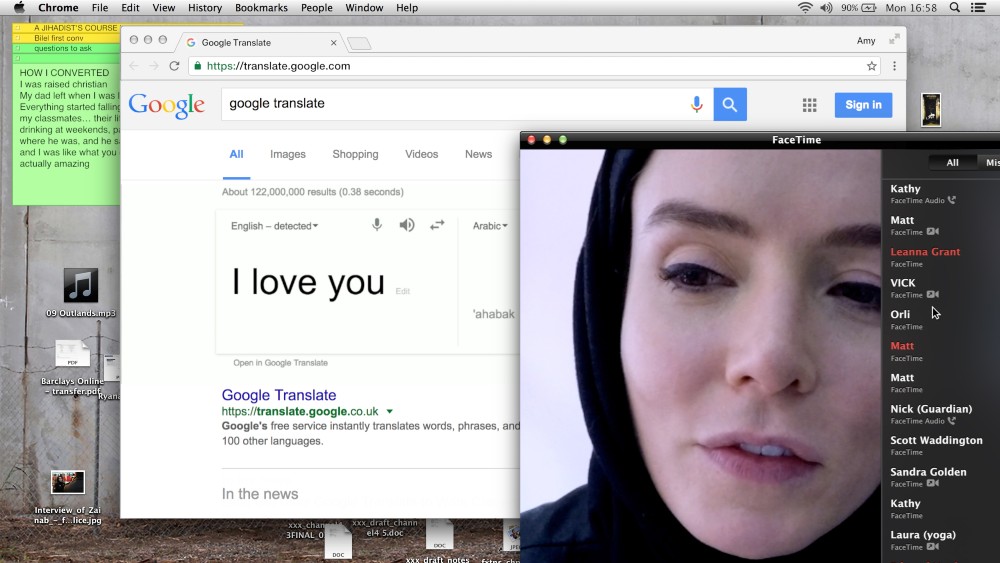
From his early days making epic (yet fairly low-budget) Russian blockbusters, such as Night Watch and its sequel, Day Watch, Director Timur Bekmambetov has constantly tried to push technological boundaries through his filmmaking.
Although he has made numerous ventures into Hollywood with films like Wanted and Abraham Lincoln: Vampire Hunter, Bekmambetov never ventured far from his home by continuing to direct and produce many feature films. It’s his role as a producer that led him to the horror film, Unfriended, a film that takes place entirely on a computer screen. Aneesh Chaganty’s Searching followed a few years later, before Bekmambetov would try his hand at what he has dubbed, “Screenlife.”
The general principle behind Screenlife is that the films being made use forms of storytelling closer to our own lives i.e. technology like laptops, smartphones, and the various apps that we use to communicate nowadays. Bekmambetov’s new film, Profile, uses the Screenlife format to tell the story of a reporter named Amy Whittaker (Valene Kane) who goes undercover to try to infiltrate ISIS, only to get caught up in the charms of a recruiter named Abu Bilel Al-Britani (Shazad Latif).
Although the entire story is told through Amy’s communications with Abu and others via her laptop, make no mistake that Profile offers as much tension as any thriller made using normal or traditional cinematic methods.
Even Bekmambetov noted the fact that for Below the Line’s interview, we were using Zoom technology that was mostly unheard of when Profile first hit the festival circuit in 2018.

Below the Line: I frequently ask directors about working with their cinematographers, which I’m not sure we can do with Profile, but I do want to talk about how you’ve been making these Screenlife movies, which would seem to be fairly easy to make, but I’m sure they’re more complicated than they look.
Timur Bekmambetov: I don’t agree, because we can talk about cinematography on this movie. It’s just a different time, a different language, and very unique. In our case, the cinematographer was not only me, because I was encouraged to figure out the lighting, but also the actors were involved. There was no real DoP in the movie. If you remember the scene when she speaks about her personal stuff, and she was in the chair, and suddenly she turned the computer, and then she gave him the most intimate information by hiding her faith. This is a perfect example of the director of photography idea, but the actor is now involved, because the actor is the cameraman in Screenlife, and it’s unique.
In this movie, Profile, it was very important for me to be as real as possible with the lighting, and there is no artificial lighting — there’s a practical –and it was still beautiful. Also, in the visual world of the movie, it’s not only what you see on the screen with the lighting, it’s also the whole screen with the icons, with the folders, with the aesthetic. It’s very informative and emotional, because every character has a different way to organize the screen, with different applications and different ways to use it. It’s an aesthetic. It’s a new language not only in acting and editing, but it’s also a different way of cinema. It’s unknown, we are just pioneering, but I think many, many talented people will find a way how to make it different, how to make it personal, how to make it emotional, and we just need to forget for a second that we can just agree that traditional cameras are not [the] only way to make movies in today’s world.
BTL: You mentioned the computer desktop and how the icons and applications are laid out, so is that something done by Production Design or Set Decoration? Props? Who sets that up?
Bekmambetov: As usual, it’s the production designer. In traditional movies, the production designer is [responsible for] what you see on the screen now. My room, the worlds, the space, but in Screenlife, it’s not only this. It’s the production designer taking care of my digital personality, or who I am in digital space. It’s still the same questions: Should the screen on my desktop be red or blue or should it be [a picture of] a monkey or an elephant? It’s exactly the same questions. It’s just that the world is more personal, because when you see somebody else’s screen, you are kind of inside the person, because it’s a very personal, intimate space. Traditionally, we don’t have it, but in my case, it’s the production designer.
BTL: Do the actors get involved with contributing to that aspect of the movie, as they might with costumes, because the computer desktop is part of creating their characters?
Bekmambetov: Exactly, especially how they interact with it, because this movie was special. In my previous Screenlife movies, actors probably didn’t interact with the screen, or pretended that there was something happening. In this movie, they were 100% in real space, because every time when somebody calls, and she answers, it would pop up, because we would call her from different computers, and there was real interaction. We recorded it as a real process almost like a theater. It helps to make the acting much more realistic, much more improvised, and with a lot of details. It was also the way of how and what they use, because the composition on the screen, you can create whatever you want, but the actor can just move things around, and it will be different. It was improvising.
BTL: I was curious how much of that could be done live, because obviously, if she is Skyping with someone live, and they’re at one location, but then the next time she Skypes, they’re somewhere else, I wondered how much of that is created in the editing or with visual effects?
Bekmambetov: It was all real. She was in Cockney in East London, but Shazad was in the Middle East. We sent him there 3000 miles away, and he was in the dusty street playing soccer with his brothers, and they really called each other, and they had [a] real conversation. I even have a letter from the Directors Guild saying that you can not do it, because the director should be on the set according to the rules. I answered them and said, “Sorry, guys, but we live in the 21st Century, and my set is 3,000 miles big. My set is Cyprus and London at the same time, and they said, “Okay, okay, we understand. We will allow you to do this movie this way.”

BTL: So it’s almost method directing rather than method acting. You made this movie a few years ago, but nowadays, it makes more sense to make movies this way, because of the COVID pandemic, because it essentially keeps people isolated.
Bekmambetov: Yes, we were a little bit ahead of time. I understood this maybe seven years ago that the cinema will change, it will be different, because we live differently. If my characters are spending half of their life staring at the screen of their computer or mobile phone, then the most important events of our lives are happening not in a physical space anymore. It’s happening online. Like now with this interview, we are not in the same place, but it’s how we live and how I learn something from you. You learn from me and how we can fight or argue. And it’s all happening online and traditional cameras can not capture this anymore. Unfortunately, filmmakers keep making movies about people in the masks, robbing banks with a car and a mask. There is no cash anymore. There is nothing to get. It’s just lazy thinking just to copy and paste what was done before, because we love traditional movies and their stupid scenes with robbing banks and whatever. But it’s a retro. It doesn’t exist anymore. In today’s world, to rob a bank, it’s a guy in the cafeteria, drinking coffee with a mobile phone and just cracking codes and stealing millions of dollars. No masks, no cars, no chase. People think it’s filmmakers telling you, “Oh, but it’s not interesting, it’s not cinematic.” I say, “No, it is cinematic, because it’s just cinema of a different era. It’s more dramatic, because if I will tell you the story of how somebody is trying to delete files on your hard drive, then you will lose all your life, your connections, all your photos and everything. That IS dramatic.
BTL: Even losing a laptop or having it stolen is a big deal, because it affects your entire life. For the last year, I’ve been watching most movies on my laptop screen, although I did see the trailer for Profile, and it looked great on the big Dolby Vision screen.
Bekmambetov: For me, it was important to release this movie theatrically, because I had many, many proposals. “Okay, give us this movie, we will put it on a digital platform,” but for me, it was very important to release theatrically, because it’s a statement. This movie is a statement that Screenlife is cinema. It’s not something temporary. It is a new language. You can make a big painting and put it in your garage or some club, or you can put it in the Louvre or the Metropolitan Museum. This is cinema for me. It’s a way how I can declare and convince people that Screenlife is a new language. It’s a big change, and we should think about it.
BTL: How are your editor and the VFX involved with the movie. You had to shoot some stuff separately and integrate it, so how was editing and VFX used to do that?
Bekmambetov: It was a long process, and we developed not only the new language and method, we developed new tools, because there were no tools to make Screenlife movies five years ago, and we developed our own Screenlife recorder. It’s a screencast recorder, allowing you to record not pixels on the screen, but the code. It was necessary, because when you record the screen, then you want to change something and you cannot because that’s all baked. I asked myself, “What if it would record not the pixels, but the code generating these pixels, then I can have all elements separately, and I can manipulate and I can change [things].” We can record not only elements but also the properties. I can record every screen with the properties, because every element has a property. In this case, this movie Profile could be interactive. You can click on your screen. You can not only watch, but it’s also like an immersive experience. You can interact with folders. This is the future, the next step, is what we’re doing now, and the next step will be immersive movies.

BTL: Do you have that patented as your own patent?
Bekmambetov: Yeah, it has a patent. It’s called “Screenlife Record.” We have two. It’s also a player, because it’s not only a recorder but it’s our own player, not MP4, not QuickTime, it’s our own player, allowing you to interact with the content. It will also allow us to adapt the content for every viewer, because you will see on screen like a movie, and I will have different elements in it, because I know who you are and can adapt it.
BTL: Okay, that sounds a little scary, because it sounds like we could be having this conversation, and then you can take the code and change it so that we’re having a completely different conversation.
Bekmambetov: No, I’m a filmmaker. I’m just telling stories, but I suppose someone could.
BTL: Profile is the first Screenlife movie you directed yourself after producing a few of the other movies, so are you generally coming up with the ideas and finding directors for some of these other movies?
Bekmambetov: The first one was my friend, my partner for maybe 25 years, Levan Gabriadze. Our company Bazelevs, is a company where we are developing things together. I’m trying to find young people [to direct], because they’re not scared to experiment, to try new things. Also, they grew up in the world of Screenlife, and for me, when I was involved in every stage, sometimes I’m visible, sometimes I’m invisible. With Searching, for example, I was trying to stay behind, because I see how talented Aneesh is. He’s very professional, and I know how ineffective it is when a producer is trying to stay behind.
But it’s different. I have a vision. My strategy is to produce 50 Screenlife movies a year with a different filmmaker, young, short and long-form series. Like we produced a great web series for Snapchat, called Dead of Night — it was two seasons, and I was producing movies in Korea, two movies now. I’m producing movies in India, with Indian filmmakers, with Indian stars. In Russia, in England — I’m trying to involve as many people as possible. Profile, it was an experiment to find a new language, because Unfriended was the first, and then I had a lot of ideas, and I made Profile just to show that Screenlife could be very delicate, could be very aesthetically elegant. It could be real. It’s not only horror — it could be just very deep stories with strong characters. For me, it does not really matter if I’m directing or producing. If I have a good director, I’m happy to stay away and see how it’s happening.
BTL: Have you been filming anything or doing post in the last year during COVID? How have you pivoted to keep making movies, and have you been using the techniques from Screenlife to film things more safely?
Bekmambetov: I just made a movie called V2. It’s a big World War II action movie about the Russian pilot [Mikhail Devyatayev], who escaped from a concentration camp on a big German bomber, a Heinkel and saved ten other people and saved the world, because it was a Heinkel with a lot of secrets of the Nazi missile program. This was an interesting experiment, too, because this movie, we shot it all online, or a lot of stuff was shot online during the COVID, and we shot 30 minutes of the action scene in the game. We used a computer game simulator, and we shot the craziest battle action scenes in the sky with airplanes in the game. And also, we were selected as one of the 10 most innovative companies in the media world in Fast Company magazine. But it was a difficult year, and we developed and made a lot of Screenlife movies, because Covid didn’t stop us, because it’s all online, and then we made this big, non-traditional movie.
BTL: Sounds great. I’d love to talk to you more about that new movie when it comes out, because I’m curious to hear how you’re using this new technology to make movies.
Bekmambetov: For me, it’s very important to be on the hinge between innovations and filmmaking, because this is where the most interesting things will happen in the next five years I think.
Profile will hit domestic theaters nationwide on Friday, May 14.
All photos courtesy of Bazelevs and Focus Features, except where noted.





